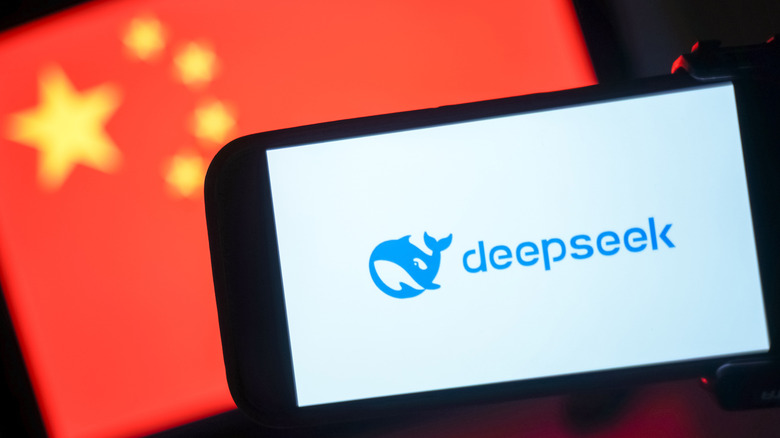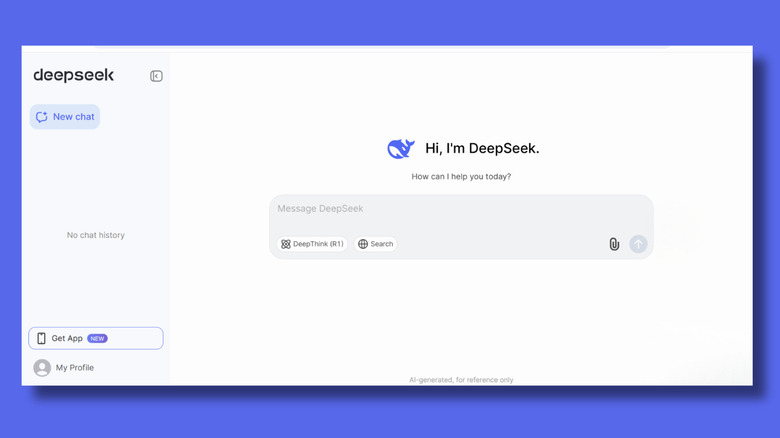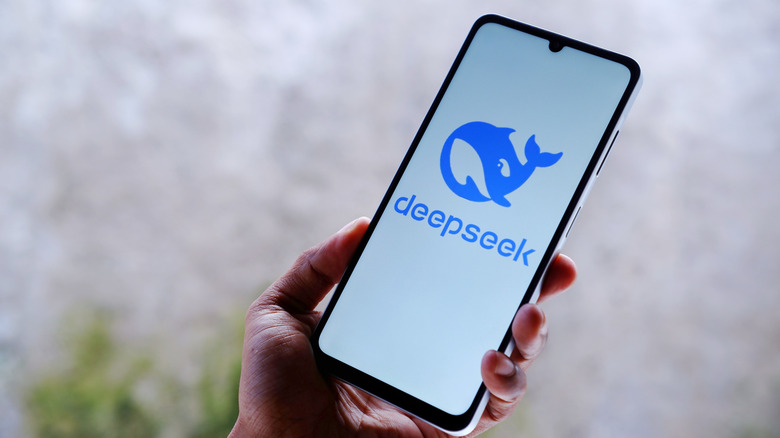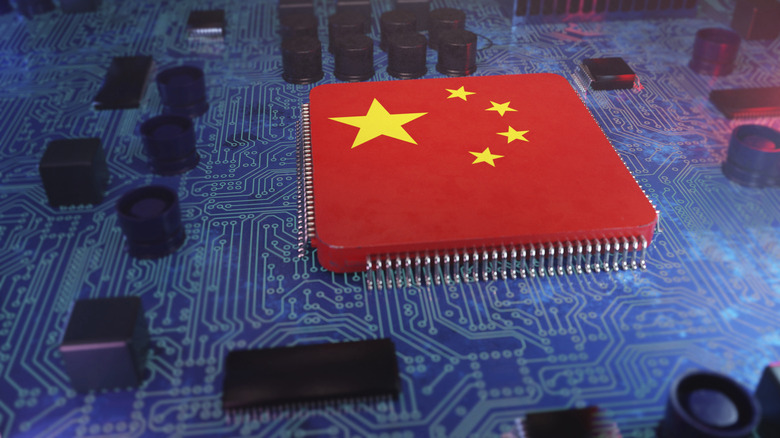DeepSeek: The Pros And Cons Of China's Groundbreaking AI Model
AI chatbot DeepSeek R1 might have only been released a few weeks ago, but lawmakers are already discussing how to ban it. This is mostly due to security concerns about user data being stored in Chinese servers. Republican Senator Josh Hawley has filed a bill "to prohibit United States persons from advancing artificial intelligence capabilities within the People's Republic of China". If made into law, this would mean that Chinese AI apps like DeepSeek wouldn't be legally accessible from U.S. servers. Currently, DeepSeek is prohibited for U.S. Navy personnel, NASA employees, and Texan government employees using official devices.
However, if you're a U.S. user who doesn't fall into any of those categories, you can — for the time being — still download and use DeepSeek. We'll look at the concerns and privacy issues later on in this article, but first, let's look at what exactly DeepSeek is and what its upsides are.
What is DeepSeek?
DeepSeek was founded by Chinese entrepreneur Liang Wenfeng in May 2023. Although the company has been producing AI large language models (LLMs) for a couple of years now, it wasn't until January 2025, with the release of its R1 model, that it became headline news around the world. DeepSeek R1 is a free-to-use LLM that is available online and as an iOS and Android app. You can also run it locally on your laptop or tablet.
It works much like other AI chatbots and is as good as or better than established U.S. platforms like OpenAI's ChatGPT, Google's Gemini, Meta's Llama, and Anthropic's Claude. Yet, DeepSeek costs a fraction of what other LLMs cost to build and run. Within a week, DeepSeek became the most downloaded free app. The effects were felt on the stock market, as Nvidia's share price plummeted as investors doubted the future profitability of Nvidia's high-end AI chips. It experienced the biggest drop ever recorded for a U.S. company.
The U.S. has tried to hamper China's AI development since 2022 by banning the sale of advanced chips made by American companies. However, Liang stockpiled less powerful H800 Nvidia chips before they too were banned in 2023. Rather than stopping DeepSeek's development, the restrictions may have incentivized the company to be more innovative.
Pros: DeepSeek is cheaper, greener, and possibly better
DeepSeek is cheaper in three ways: to build, for servers to run requests because it uses less memory, and — unlike ChatGPT, Gemini and others — it's free to download and use the full version. It cost $6 million to build, which is, comparatively speaking, a shoestring budget compared to the amounts that OpenAi, Meta, and Google have already invested. It's ironic that its release coincided with Trump's Stargate announcement, which pledged to invest $500 billion in U.S. AI infrastructure.
The reasons why DeepSeek is cheap are the same reasons that make it more environmentally friendly. Its lower computational power uses one-tenth of that of Meta's Llama 3.1 and has shown that it is possible to build an effective high-powered AI model without the massive amounts of electricity, water, and high-powered GPUs that have been previously assumed to be necessary.
Is DeepSeek technically superior to existing LLMs? That depends on what you're using it for. As yet, DeepSeek-R1 doesn't handle images or videos like other AI products. However, as an LLM, DeepSeek performed better in tests than Grok, Gemini, and Claude, and its results were on par with OpenAI o1. However, it looks like OpenAI may have retained its edge by releasing o3-mini just 11 days after DeepSeek R1.
Some testers say it eclipses DeepSeek's capabilities. DeepSeek still wins on price, though. For an unspecified limited time, o3-mini is available to try on the free plan, but after that, OpenAI users will need a paid plan to access o3-mini. Like OpenAI o1 and o3, DeepSeek uses self-improving reinforcement learning to improve its responses over time. Compared to previous types of AI like ChatGPT 4o it spends longer 'thinking', but can break down tasks and provide more reasoned answers.
Cons: The Chinese Government will have access to your data
So, with all that going for it, why has it had such a frosty reception from world governments? Anyone who has been keeping pace with the TikTok ban news will know that a lot of people are concerned about China having access to people's data. A report from ABC News revealed that DeepSeek has hidden code that can transfer user data directly to the Chinese government. Cybersecurity expert Ivan Tsarynny said that DeepSeek contains "direct links to servers and to companies in China that are under control of the Chinese government." The hidden programming showed data-sharing with China Mobile, a company owned by the Chinese government that was banned from operating in the U.S. in 2019.
All Chinese companies are also required to abide by its National Intelligence Law, which states that they must "support, assist and cooperate with national intelligence efforts." The influence of the Chinese government is apparent in DeepSeek's widely reported censorship of subjects like the Tiananmen Square massacre and the political status of Taiwan.
DeepSeek has already been banned outright in Italy to "protect the data of Italian users." Although this is the only country so far to do this, many countries, including Taiwan, Australia, and South Korea, have banned its use by government employees or agencies. DeepSeek may also fall foul of the European Union AI Act, which aims to "foster trustworthy AI in Europe" and outlaw AI that poses an "unacceptable risk".
These measures show that DeepSeek's success might be short-lived. If Hawley's proposed ”Decoupling America's Artificial Intelligence Capabilities from China Act" becomes law, then using the app in the U.S. would be punishable by a $1 million fine or imprisonment.
What happens next?
However, the legal side of things pans out, DeepSeek R1's release will probably trigger a wave of innovation and competition that could ultimately benefit consumers. By demonstrating that high-performing AI models can be developed at a fraction of the cost traditionally associated with such projects, DeepSeek has challenged the status quo. According to an anonymous employee, Meta is already looking into how to leverage DeepSeek's low-cost techniques.
This shift could lead to better, more affordable AI tools. Companies are likely to step up their game to match DeepSeek's cost-effective approach, and users should see improvements in the quality and affordability of AI products. DeepSeek's success has already inspired researchers at Berkeley to create TinyZero, a new AI model that replicated DeepSeek using only $30. Admittedly, the only thing it can do is play the numbers puzzle from the game show Countdown. It does, however, achieve its goal of demystifying AI reinforcement learning and making AI more accessible.
DeepSeek has enabled people to realize that others could do something similarly impressive. If it spurs tech geniuses to become more creative and 'think outside the box', then the effects of DeepSeek might still be felt long after it has been forced to close up shop in the U.S.




